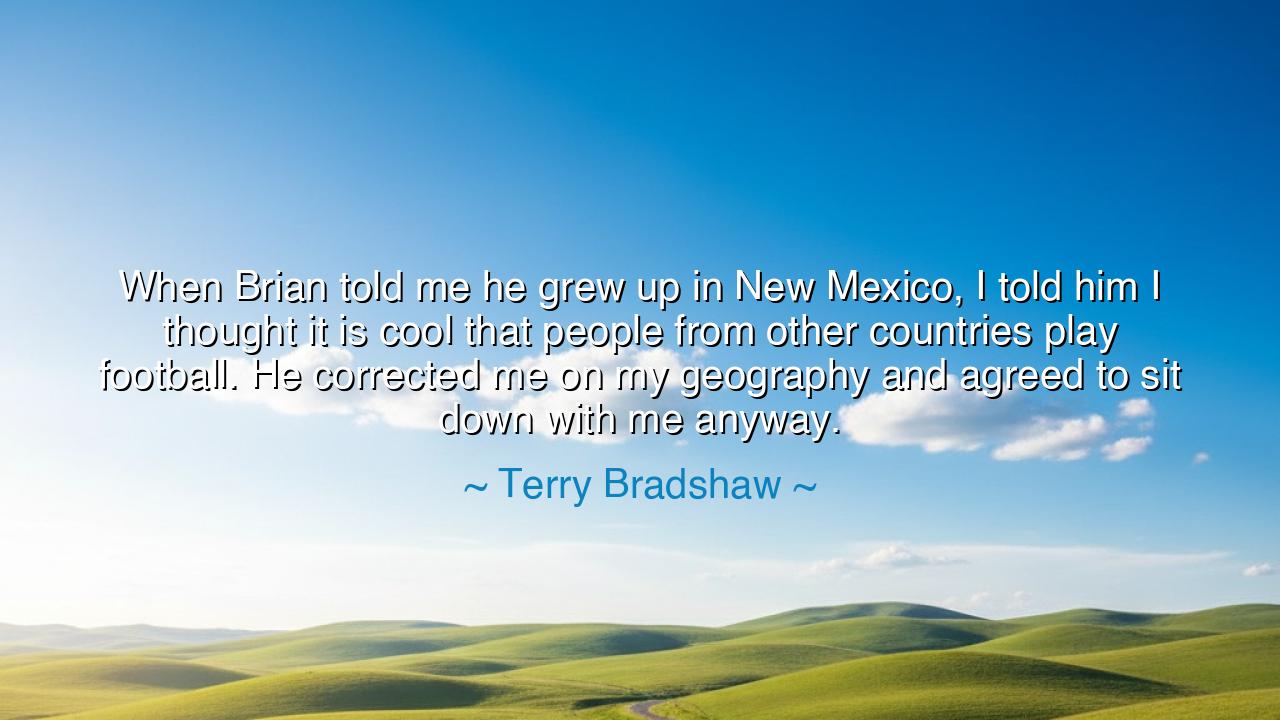
When Brian told me he grew up in New Mexico, I told him I thought
When Brian told me he grew up in New Mexico, I told him I thought it is cool that people from other countries play football. He corrected me on my geography and agreed to sit down with me anyway.






"When Brian told me he grew up in New Mexico, I told him I thought it is cool that people from other countries play football. He corrected me on my geography and agreed to sit down with me anyway." These words spoken by Terry Bradshaw reveal a moment of humility, learning, and connection. Bradshaw, a legendary football player, acknowledges his own mistake—his confusion between New Mexico and another country—while highlighting how the error was met with grace and understanding. In this humorous reflection, we see the importance of correcting mistakes without judgment, and the value of coming together despite our differences, even when those differences stem from a simple misunderstanding.
In the ancient world, the concept of learning and humility was highly revered. Socrates, the great philosopher, was known for his method of questioning—always asking others to critically examine their beliefs and assumptions. But Socrates also embraced the fact that true wisdom lies in knowing that we do not have all the answers. He famously said, “I know that I am intelligent, because I know that I know nothing.” Bradshaw’s recognition of his geographical mistake echoes this ancient truth—that in admitting we do not know everything, we create the opportunity for growth and understanding. Just as Socrates embraced the humility of his own knowledge, Bradshaw shows us that even the most accomplished among us can make mistakes and learn from them.
Consider the example of Alexander the Great, whose conquests spanned across many lands. Despite his military genius and strength, he was not immune to errors in judgment. On one occasion, he failed to recognize the significance of an alliance with a tribe he had conquered, and this misstep nearly cost him a crucial victory. But Alexander, like Bradshaw, understood the importance of correcting mistakes and learning from them. He adjusted his strategy, making the necessary amends, and continued on to become one of the most revered figures in history. His willingness to learn from his errors shows the power of embracing our shortcomings and moving forward with wisdom.
Bradshaw’s story is not just about a funny misunderstanding, but about the way we handle errors in our lives. It highlights how easily we can fall into the trap of assuming we know everything—whether it is about geography, culture, or people—only to discover that we need to pause and reflect. It is easy to let pride or ego cloud our judgment, but the truly wise approach is to acknowledge our mistakes with grace and be open to learning. Humility, rather than pride, allows us to grow, to form genuine connections, and to approach the world with an open heart.
In a broader sense, this story speaks to the need for empathy and understanding when interacting with people from different backgrounds. Bradshaw’s interaction with Brian is a perfect example of how small moments of misunderstanding can be turned into opportunities for connection. Just as in ancient Rome, where cultural exchange was valued and embraced by emperors and citizens alike, today we can learn from each other’s diverse perspectives. Whether through sports, travel, or day-to-day encounters, the world offers us countless opportunities to break down barriers and connect with others. It is through these moments of shared learning that we expand our own worldview and grow as individuals.
The story also reflects the importance of forgiveness—not just in others, but in ourselves. How often do we let small mistakes or misunderstandings grow into larger obstacles, when in reality, all it takes is a moment of self-reflection and humility to move past them? Bradshaw’s willingness to admit his mistake and continue building a relationship with Brian, despite his error, serves as a reminder that our connections with others are far more important than our need to be perfect. The willingness to admit mistakes and learn from them strengthens our character and enhances our relationships with those around us.
The lesson here is clear: embrace the humility to admit when you don’t know something, to correct mistakes with grace, and to view errors as opportunities for growth. Just as Socrates, Alexander the Great, and Terry Bradshaw recognized that learning is an ongoing process, we too must stay open to the possibility of growth, even in the midst of our mistakes. Every misstep is a chance to deepen our understanding and to strengthen the bonds we share with those around us. Let us take action by embracing humility, forgiveness, and the joy of learning, so that we may continually evolve into wiser, more compassionate beings.






AAdministratorAdministrator
Welcome, honored guests. Please leave a comment, we will respond soon